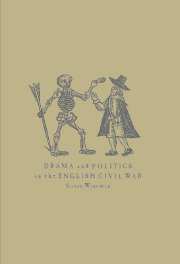Book contents
- Frontmatter
- Contents
- List of illustrations
- A note on texts and list of abbreviations
- Acknowledgements
- Preface
- Introduction: how the drama disappeared
- PART I 1642–1649: CASES IN POLITICS AND DRAMA
- Interchapter: ‘The life of action’: playing, action and discourse on performance in the 1640s
- PART II THE 1650S: PROTECTORATE, POLITICS AND PERFORMANCE
- 4 Gender and status in dramatic discourse: Margaret Cavendish, Duchess of Newcastle
- 5 Royal or reformed? The politics of court entertainment in translation and performance
- 6 National identity, topic and genre in Davenant's Protectorate opera
- 7 Genre, politics and place: the social body in the dramatic career of John Tatham
- 8 True and loyal? Politics and genre in Civil War and Protectorate tragicomedy
- Coda
- Notes
- Select bibliography
- Index
4 - Gender and status in dramatic discourse: Margaret Cavendish, Duchess of Newcastle
Published online by Cambridge University Press: 20 August 2009
- Frontmatter
- Contents
- List of illustrations
- A note on texts and list of abbreviations
- Acknowledgements
- Preface
- Introduction: how the drama disappeared
- PART I 1642–1649: CASES IN POLITICS AND DRAMA
- Interchapter: ‘The life of action’: playing, action and discourse on performance in the 1640s
- PART II THE 1650S: PROTECTORATE, POLITICS AND PERFORMANCE
- 4 Gender and status in dramatic discourse: Margaret Cavendish, Duchess of Newcastle
- 5 Royal or reformed? The politics of court entertainment in translation and performance
- 6 National identity, topic and genre in Davenant's Protectorate opera
- 7 Genre, politics and place: the social body in the dramatic career of John Tatham
- 8 True and loyal? Politics and genre in Civil War and Protectorate tragicomedy
- Coda
- Notes
- Select bibliography
- Index
Summary
INTRODUCTION
How did women writing during the Civil War and Protectorate use dramatic discourses, and how were women positioned by these discourses? The 1650s saw the writing of plays by at least one female dramatist, Margaret Cavendish, Duchess of Newcastle, and this chapter investigates her relationship with theatre and politics. In doing so, it concentrates on the ideas of female performance in her plays, and Civil War challenges to social hierarchy.
In one of the many preambles to her first volume of plays – written in the 1650s and published, after delays, in 1662 – she wrote:
I cannot chuse but mention an erroneous opinion got into this our Modern time and men, which is, that it should be thought a crime, or debasement for the nobler sort to Act Playes, especially on publick Theatres … for certainly there is no place, wayes or meanes, so edifying to Youth as publick Theatres, not only to be spectators but Actors; for it learns them gracefull behaviours …
Significantly, she includes public theatres in her claim for theatre as the cultural capital of the nobility. The emphasis on the moral power of theatre is in accord with the general thinking of her circle, which included Thomas Hobbes and William Davenant. We see clearly her concern with status, and her desire to claim the theatre for the nobility.
- Type
- Chapter
- Information
- Drama and Politics in the English Civil War , pp. 91 - 113Publisher: Cambridge University PressPrint publication year: 1998



